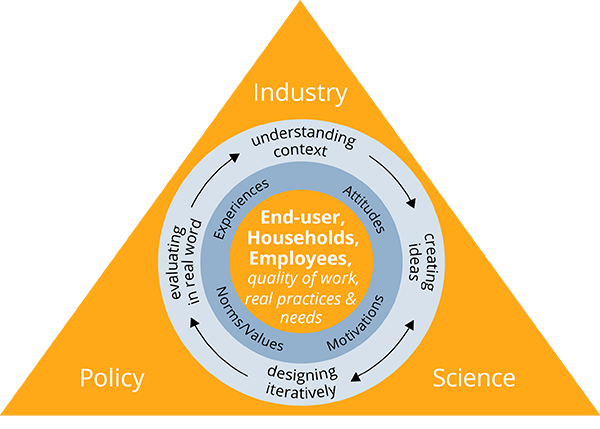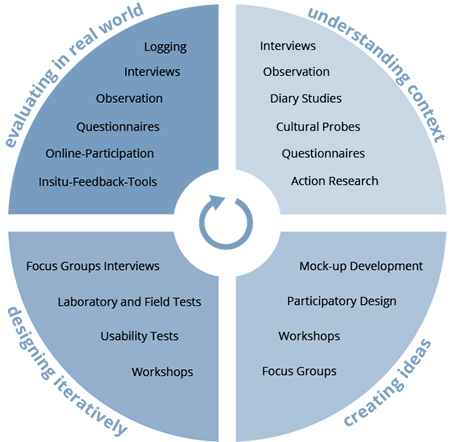Since 2009 there have been PRAXLABS as network of research and excellence in the wider area of Siegen-Wittgenstein and Dortmund, Germany. They are composed of a network of regional research, industry and application partners, and of different settings – for instance domestic environments and public places where everyday life is encountered, virtual communities or working environments. Researchers, industrial companies, public institutions and users/consumers can participate and collaborate in these settings.
We consider our research and development as a close symbiosis between the defined field of application and the different groups of stakeholders. The participatory inclusion of users adopts a special focus in this context. Appropriate to the demand of the research project, we involve interested users who can participate actively in the different development and design stages. Right now, over 100 users of our steadily growing panel are participating in current research projects.
The cultivation of these contacts allows us to embed the growing technology into recognizable methods, which can be empirically evaluated and improved. Through this cooperation, we are able to offer our users the opportunity to participate actively in the design process with the intention of developing new solutions. Arising concepts of this method as well as early prototypes can be investigated in long-term evaluations in the field. In addition, they also can be discussed, tested and developed in a lab setting at the university. The iterative research and development process is widened by the early exploration of the appropriation and usage behavior in the actual application field. The advantage of this step is that the integration of ICT solutions into everyday life will uncover context-specific problems or unintended usage faster. The information gained can be inserted immediately into improving users’ acceptance as well as improving usability and the further development of ICT solutions.

Goals
Both PRAXLABS infrastructure and the connected collaboration approach with its strong focus on users are incorporated in our research activities and essentially support the different stages of the development and design cycle.
This leads to an improvement of the following aspects:
Context understanding:
- Improved comprehension of the context and applied technology in use
- Identification of habitual use and behavior patterns
- Improved identification of application gaps and needs
- Figuring out future usage practices and trends
- Building of trust relationships between users, developers, designers and researchers
Concept design:
- Creating ideas, developing new concepts and improving concept ideas in the discourse between users, developers, designers and researchers
- Activating users to generate ideas and as a source of innovation
Prototypical development:
- Improved technology development and quality enhancement through iterative development and evaluation stages in the interaction with users under controlled circumstances and in everyday life
- Early analysis of functionalities and acceptance as well as identification of problems
Evaluation in the field:
- Early identification of usage problems in everyday life (privat and work context)
- Providing ideas and suggestions for improvements through in-situ feedback
- Long-term evaluation on the appropriateness of new applications and technologies
- Minimizing the acceptance risk in future marketing implementation
- Identification of future usage trends
Methods and Tools
Within iterative development and design processes in the Living Lab, different methods and tools can be applied. The following table offers an overview concerning different design stages and their appropriate methods:

